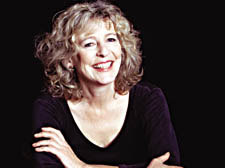
Deborah Moggach: grew up with stories of women affected by war |
On the home front
Hampstead author Deborah Moggach talks to Ruth Gorb about her grandmother, whose wartime experiences inspired her latest novel
In the Dark. By Deborah Moggach.
Chatto & Windus £12.99 order this book
IN 1890 a baby girl, Helen Johnson, was born in Keats House in Hampstead. It was a time when prosperous, upper-middle class families such as hers could rent elegant Regency houses, and the little girl led a charmed childhood, playing under the mulberry tree where Keats wrote Ode to a Nightingale.
She grew up to be a beauty, trained to be a singer under the legendary Cicely Courtnedge, and was one of an artistically raffish Hampstead set: she liked to tell her granddaughters of the time she was in the ladies’ cloakroom of the Everyman (the cinema was then a rather superior dance-hall) and saw the King’s mistress, Lilly Langtry, pulling down the bodice of her dress and putting rouge on her nipples.
One of those grand-daughters was Deborah Moggach. She adored her grandmother, who virtually brought her up in the family home in St John’s wood. “She lived with us until she died, at 87, and she was wonderful. I used to pull whiskers out of her chin, and I loved her wrinkled hands.”
Moggach, at home in Hampstead just around the corner from Helen Johnson’s childhood home, says that after the blissfully happy early years, her grandmother’s life was clouded by tragedy. She married an army officer, Tommy Roughton, and had a baby son.
Tommy was killed at the Front in March 1918. Her brother was killed two days before the Armistice. Eleven of her male cousins were killed in combat. All the young men in her family were wiped out.
As a widow with a tiny baby, she was energetically wooed by one Dr Henry Woodyatt. She agreed to live with him for a while, and then married him in St Stephen’s Church in Pond Steet, Hampstead.
Charlotte, Deborah Moggach’s mother, was born within a year, but the marriage was a disaster. Helen picked up her two small children and walked out. She made a little money by sewing and taking in lodgers, but life was hard – the family money by-passed her because of her “scandalous” behaviour. She was, says Deborah Moggach, a casualty of the war.
“And there were so many of them, women whose husbands had died and who re-married, often out of desperation. I grew up with the story. Eithne, the central character of my book, In the Dark, is quite unlike my grandmother, but it always had me thinking ‘if that sniper’s bullet had been an inch away’.
“All the personal stories are now drifting into history. So much has been written about the First World War and so much about the Home Front in the Second World War. But what about the people at home during the First World War, the women and the children left behind?”
Moggach felt that they deserved to be remembered, and she has written about them with her customary verve and compassion and humour, her characters leaping off the page to such an extent that one of her delighted reviewers wrote that as this is bound to be made into a television drama, why not read the book first? Not on the cards at the moment says Moggach wryly, although she is now at work on an important new series for BBC television – an adaptation of the dairies of Anne Frank.
She has just come back from Amsterdam, where she was fortunate enough to have an hour alone in the Franks’ house before official opening; a million people a year queue to see the house where Ann was hidden from the Nazis, and the rooms are always crowded.
“To be in those rooms by myself – the atmosphere was extraordinary. You can see from the confusing lay-out of the house how easy it was to hide people. Otto Frank’s business was carried out by his partners in front of the house; they used to supply the family with food and he used to creep down at night for meetings. I was able to stand in the room where Ann lived and lookout of the attic window; that open window was the only fresh air she had for two years.”
When the BBC commissioned her to write the series she felt honoured and daunted – even more daunted, she says, than when she was asked to adapt Pride and Prejudice. “Ann Frank is even more revered than Jane Austen, and the story is so much more important.”
The rights to the diary have only recently been released and she saw that earlier adaptations had not been true; they were sugary, even inaccurate. Another adaptation was needed, and this one will be shown in a way that will intensify the emotional effect: there will be five half-hour episodes over one week – a sort of video diary, says Moggach.
Why does the story live on, and why has Anne Frank become such an icon for the hundreds of thousands of young people who continue to visit her house?
“She was the first teenager. She was writing about something so terrible, in a way that was fresh and contemporary. She was stroppy, she was funny, yet she faced every day the fact that she had done nothing wrong, and people wanted to kill her. That is an unbearable thing for a teenage to cope with.
“One of the women who helped the Frank family in the house, Miep, has said that Anne is not a symbol of the lost Jews. It is her story. And there are thousands more like it.”

|